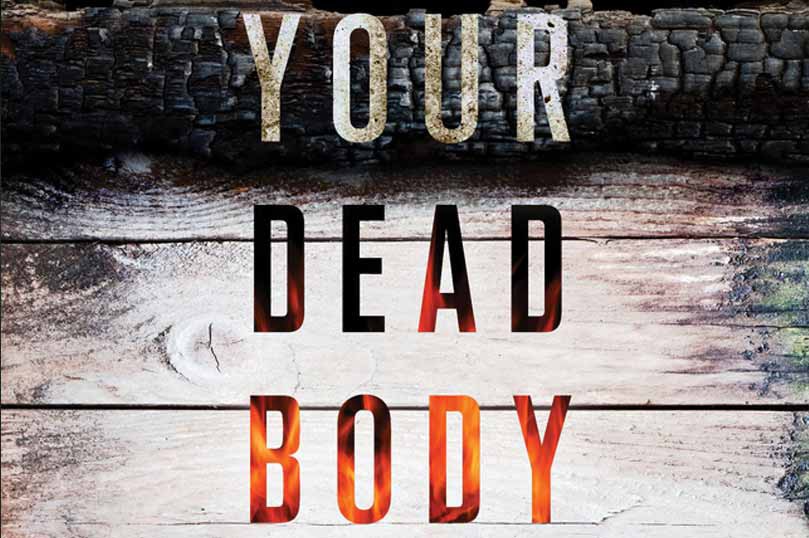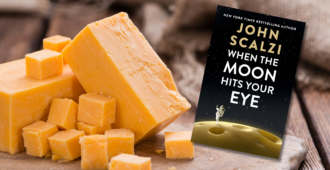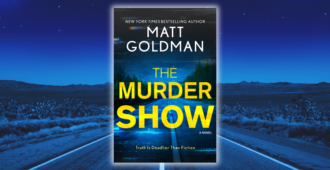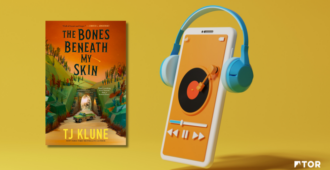 In Over Your Dead Body by Dan Wells, John and Brooke are on their own, hitchhiking from town to town as they hunt the last of the Withered through the midwest–but the Withered are hunting them back, and the FBI is close behind. With each new town, each new truck stop, each new highway, they get closer to a vicious killer who defies every principle of profiling and prediction John knows how to use, and meanwhile Brooke’s fractured psyche teeters on the edge of oblivion, overwhelmed by the hundreds of thousands of dead personalities sharing her mind.
In Over Your Dead Body by Dan Wells, John and Brooke are on their own, hitchhiking from town to town as they hunt the last of the Withered through the midwest–but the Withered are hunting them back, and the FBI is close behind. With each new town, each new truck stop, each new highway, they get closer to a vicious killer who defies every principle of profiling and prediction John knows how to use, and meanwhile Brooke’s fractured psyche teeters on the edge of oblivion, overwhelmed by the hundreds of thousands of dead personalities sharing her mind.
Chapter 1
“A.”
I looked up, holding the side of the truck bed as we rattled down the highway. Wind whistled in my face, changing its pitch as I raised my head. I’d fallen asleep, and my dreams—all blood soaked, all screaming—faded away in welcome relief. In a panic, I looked for Brooke, fearing the worst, but she sat beside me, her short hair whipping around her face, and she smiled. She hadn’t jumped. She was fine. She pointed at a billboard as we passed it.
“Proud America Motel,” she said. “Ten miles. I could get all the way up to E with that, but there’s no B.”
We were in farmland, by the look of it: low fences on either side of the road, the flat land beyond covered with wheat and sectioned into squares by fences and trees and old dirt roads. A cloud of dust hung in the air a few miles off to our left; some farmer or ranch hand driving a tractor on a dirt road. The truck jostled us again, and Boy Dog whined. He liked his floors stable, so they didn’t disrupt his sleep, but hitchhikers have to take what they can get. Brooke put a hand on his head, scratching the fur behind his floppy, basset hound ears. I scanned the farms again, hoping for an orchard, but it looked like nothing but wheat as far as the eye could see. An orchard we could have eaten in, but wheat might as well be a field full of sticks.
“There we go,” said Brooke, pointing at another sign. “This Highway Adopted by the Baker Community Church. B, C, D, E.”
“Are there really enough signs to play your game?” I asked. “We’re in the middle of nowhere.”
“Ten miles from a motel,” said Brooke. “That means we’re ten miles from whatever town we’re going to, maybe less.”
“That’s not too bad, then,” I said—and even though I knew the number by heart I added up our money again in my head: one hundred thirty-seven dollars and twenty-eight cents. I remember when I used to never count the cents—round everything down to the nearest dollar and lose the change in the couch. These days that was a luxury too painful to think about. Save enough change and you eventually get another dollar. A dollar could buy a burger in a truck stop, or some apples if we found a roadside stand. My stomach rumbled, and I put the thought of food aside. Don’t think about it until it’s close, I thought, you’ll just torment yourself.
Wind lashed my hair back and forth across my eyes. I needed to cut it. Brooke had cut hers short last month, a kind of page-boy cut that was easier to maintain on the road. I looked at her peering ahead, past the cab of the truck, searching for more road signs. She probably needed another cut soon, too. We both needed a shower.
“What’s the name of it?” she asked.
“Of what?”
“The town we’re going to.”
“I told you already,” I said, and instantly felt badly about it. The edges of her mouth tipped down in a frown, from frustration or embarrassment, or maybe both. “Baker,” I said softly. “Same as the church sign we just passed.”
“I don’t remember,” she said. “You must have told one of the others.”
I nodded, looking behind us at the road as it slipped away into the distance. Long and flat and lost in a faraway bend. One of the others. “Do you know which one?”
“F, G,” she said, letting my question slip by without an answer. “Food and Gas, Five Miles. Now we need that hotel sign again; we could get H and I.”
“And get stuck on J,” I said. “We never see Js.”
Brooke nodded, staring ahead, but her eyes looked blank—not searching, but simply staring, lost to the world and deep in some memory from another life. “Maybe Kveta,” she said at last, answering my question from earlier. “I’ve been her a lot lately. Or Brooke. I think I’m her more often than not.”
“That’s because you—” I started, and then stopped myself. Brooke was her default state, or at least it used to be. If it wasn’t anymore, bringing it up would only make her feel bad. It made me feel bad to think about it, because this whole problem was my fault. It was supposed to be Brooke’s body; I was the one who’d let all those other memories in there.
I used to never feel bad about anything, but now …
Well, that’s not true. I used to feel bad all the time. I guess the difference is that now, sometimes, I felt good, and the contrast made the bad times that much worse.
I kept my eyes on the road, avoiding her eyes. “Who are you now?”
She glanced at me, though in my peripheral vision I couldn’t tell if she was hurt or surprised or simply curious. “You don’t know?”
“Sorry,” I said. Brooke had been possessed by a monster who had previously possessed tens of thousands of other girls, maybe hundreds of thousands, and all of their memories and personalities had fused with hers. Barely a fraction of the memories in Brooke’s head were actually hers, and with numbers like that you could never tell which personality would rise to the surface in any given moment. “You all have Brooke’s face, you know. You need to … announce yourselves or something.”
“I’m Lucinda,” said Brooke. “You remember me, right?”
I nodded. She was Lucinda a lot, especially while we were traveling, though the little I knew about Lucinda didn’t suggest a lot of travel. “You died on your wedding day,” I said, then paused, looking at her curiously. “Lucinda died hundreds of years ago. How do you know the alphabet billboard game?”
“I don’t know,” said Brooke/Lucinda with a shrug. “I just do.”
I sat up straighter, curious, my back against the wall of the truck bed as I gripped it for balance. “Do you think that means anything? About how your personalities talk to each other?”
“We can’t talk to each other,” she said. “We just kind of share things—like, I know some things that Brooke knows, and some things that Aga knows, and different things from different girls. I don’t know how it works.”
“But do you want to?”
She said nothing for a long time, thinking and scratching Boy Dog’s head. The truck slowed slightly, and Brooke shouted abruptly: “H, I, J, K! Baker Junior High!” She pumped her fist and leaned against the side of the truck bed to look ahead past the cab. “Yes! Js are impossible! Let’s see what else we can find.”
We were driving into the town itself now—still a mile or two out from the main drag, but close enough that buildings were starting to pop up more frequently. We passed the Proud America Motel, but I hoped we didn’t have to stay there; I thought about money differently now that I was carrying our entire worldly possessions in a pocket and two backpacks. We could afford a night in a motel—probably several, if it was as cheap as it looked—but then what? Having money wasn’t the same as having income. If we spent it all today, where would we stay next week, and how would we eat?
One hundred thirty-seven dollars and twenty-eight cents. We could get more, sometimes, from the stashes Albert Potash had left here and there around the country. Money and guns and supplies, in bus station lockers and storage units and sometimes gyms or rec centers. We’d found the list in his gear after he’d died and it had kept us going for over a year now, but even that was running dry. There were only a few locations left, and the nearest one was thousands of miles away.
“L,” said Brooke, skipping from letter to letter without slowing down to say where each had come from. “M.” Pause. “N, O, P. Dangit, we’ll never find a Q.”
“Look for ‘equipment,’” I said, closing my eyes and trying not to fixate on our dwindling funds. “Someone’s bound to be selling farm equipment in this town. Or maybe there’s a quality … something. Quality Hair Salon.”
Brooke laughed. “You think they have hair salons that good in a town this small?”
“I think the scale of quality is relative,” I said, permitting myself a small smile. Anything that made Brooke laugh was a good thing. “The best one in town is the quality one, regardless of the wider world of hair care.”
“Maybe we’ll get lucky and find a place that sells quality farm equipment,” she said. “Then we’d have a Q for each of us.”
“I’m not playing.”
“But you could.”
“I suck at this game.”
“That’s because you try to spell things out,” she chided. “You can’t just see a car and claim the letter C, you have to see the C written somewhere.”
“But you never let me write it.”
“Obviously you can’t just write yourself, that’s cheating.”
I shrugged and looked at a passing restaurant. “I don’t think I get the allure of this game.” The restaurant was a greasy dive, some Dairy Queen knockoff called Dairy Keen. Probably out of our price range, unless there was literally nothing else in town. I saw a couple of teenagers in front of it, just hanging around, leaning on the front wall, and it reminded me of the old Friendly Burger back in Clayton. A tiny little place where nobody ate but the locals, and then only until a McDonald’s opened up. Brooke and I had gone on a date there. And Marci and I, too. There weren’t a lot of options in a town like Clayton. Or Baker, by the look of it.
I missed Marci. I tried not to think of her, but she was always with me, like a ghost in the back of the truck. Invisible and intangible yet relentlessly, inescapably present.
“No Q on the Dairy Keen,” said Brooke. “Come on, guys, think about the alphabet game when you name your restaurants. Doesn’t anybody plan ahead?”
I thought about our next moves. Our first stop would be a bus station, if we saw one, or a bank if we didn’t—not because we had any use for a bank, but because it was a good place to ask about a bus station. We couldn’t just ask anywhere in a little town like this; we looked so obviously homeless that if we walked into a store, word of the teenage beggars would spread too fast and we’d get locked out of any real assistance. Small-town shop owners looked out for each other. Bank tellers, on the other hand, tended to move in different circles, and we could talk to them without any real fear that they’d call the local grocery store to warn them. Our end goal, of course, was that bus station, where we could find either cheap showers or some fellow drifters who could tell us where the nearest shower might be. Drifters looked out for each other just as much as shop owners. Once we were clean and changed into some better clothes, we’d look like regular tourists passing through on the way somewhere else and we could walk around the town without setting off any mental alarms. We’d get some food and then look for the church—not Baker Community, but the other one. The commune. The reason we’d come here in the first place. I figured most of Baker’s regular residents wouldn’t want to talk about it, but they’d all know about it, and if we got lucky they’d point out one of the members.
“Quality Feed and Fertilizer,” said Brooke. “Q and R. And over there’s an S, T, U … V. Video Rental. They still rent videos in this town? Did we hitchhike into the past?”
“Looks closed,” I said. We’d had a place like that in Clayton—it rode the home DVD boom, then crumbled when the Internet made their business obsolete. They’d closed a few years ago, and nothing had moved into the building. Looked like the same story here.
“At least they left the sign up,” said Brooke. “I’m glad somebody in this town was thinking about my needs.” She grimaced, and looked at me. “What’s it called again?”
“The town?” I asked. She might have just switched personalities again; a lot of ideas transferred from one to the next, but some didn’t, and she tried to hide the transitions by faking a poor memory. “Baker,” I told her. “We’re here to look for The Spirit of Light Collective.”
“Yashodh,” said Brooke, nodding. “We’re going to kill him.”
I felt the old, familiar pull of death. “Or he’ll kill us.”
“You say that every time.”
“One of these days it’ll be true.”
The truck was slowing, probably looking for a good place to drop us off. I grabbed the strap of my backpack, getting ready to jump out, but saw that Brooke was ignoring hers, staring instead at the buildings we were driving past: tall brick storefronts with ornate, peaked facades on the second story. Some of them were painted, some were covered with wooden or vinyl siding, others were bare brick or bore the residue of old-timey signs too weathered to read. A barber shop. An antique store. A pizza place that looked way more modern than the rest of the street. I wondered if we could beg any food from the back door.
The truck pulled to the side of the road, by a bright green lawn in some kind of town plaza—city hall probably—and I was already over the side and reaching back for Brooke’s bag when the driver rolled down his window. “This good? I could take you a few more blocks if you want.”
“This is perfect,” I said. A few more blocks would have been nice, through the town and out the other side where we could infiltrate at our own pace, but it never helped to ask the drivers for extras. Always make them feel generous, not put upon—like they would have done more if they could, instead of wishing they’d done less. Instead I pointed at the tailgate. “Do you mind if I open the back to get the dog out?”
“No problem,” said the driver. He didn’t offer to help, which meant I was probably right to refuse the extra ride. He was already forgetting us, free of his hitchhiker burden with his mind a mile down the road. I dropped the tailgate and lifted Boy Dog out, smelling the strong scent of dirt and hound. He needed a bath as much as I did. He sat on the sidewalk where I left him, scratching his ear with his stubby front leg, and I offered Brooke my hand. She seemed lost in some kind of reverie again, all too common for her, and I said her name to get her attention.
“Brooke?”
She turned to look at me, but her eyes showed no recognition. “Who?”
“Lucinda.” I said, remembering. There was no response, so I tried another. “Kveta?”
“I’m…” She paused. “I’m so sorry, John.”
The warning signs were all over her face—the disorientation, the downcast eyes, the subtle whine in her voice. I put on my biggest smile and grabbed her hand, knowing that physical contact was one of the best ways of bringing her out of a mood swing. “We got here early,” I said, “everything’s great.”
“I don’t want to be this way,” she said, not moving. I tugged gently on her hand, trying not to glance at the driver for signs of impatience. If he yelled at her to hurry, it would only make her worse.
She remembered the lives of a hundred thousand girls, and she remembered dying as every single one of them. Suicide was as natural to Brooke as breathing.
“You want some pizza for dinner?” I asked. “I saw a good place about a block back.”
“We can’t afford pizza.”
“We can splurge,” I said, and pulled on her again. “Come on, let’s go take a look. What do you think they have here, deep dish or New York style?”
She didn’t respond to the conversational bait, but another gentle tug on her arm finally prompted her to climb down from the truck bed. She dusted herself off with a grimace, showing far more emotion than the dirt seemed to merit. I risked letting go of her for three precious seconds, closing the tailgate and shouting a thank you to the driver. He drove off without a word, and Boy Dog barked irritably at the cloud of exhaust that puffed into his face.
“My name is Pearl,” said Brooke. “Pearly, they called me, and my father said I was the jewel of his life. I had a dozen suitors, and the finest horse in the county. We won all the races that year, but they let me win. I don’t know why. I was horrible, and if I’d lived to know them better they’d have seen me for what I was—”
“I’m starving,” I said, cutting her off instantly at the mention of death. I had one of her hands clasped in mine, and brought up the other quickly, looking closely at her eyes, not talking her out of it because that never worked, but talking around it. Distracting her from it. “My favorite pizza topping is mushrooms,” I said. “I know a lot of people don’t like them, but I think they’re delicious—soft, savory, full of this incredible flavor. When you put them on a pizza they get roasted right there in the oven, hot and fresh, and they go perfectly with the tomato sauce. Do you like mushrooms?”
“I threw myself off of that horse,” said Pearl. “I … don’t even remember his name. He’s not the one that killed me, anyway, it was the ones behind me. No one could swerve in time, and they trampled me right there in front of everybody.”
“What about pepperoni?” I asked. “Everybody likes pepperoni. And that red pepper stuff you can shake on top—you think this place has that? Let’s go check it out.”
“Will you stop it!” she yelled. “I know what you’re doing, and I hate it! You always treat me like this!”
I took a deep breath, trying not to look too worried—this wasn’t exactly a bustling street, but if she attracted too much attention it could be disastrous. Even without a suicide attempt, there were people looking for us—people and things. Things we desperately didn’t want to be found by. If she started fighting me, the police would get involved and we might be trapped for good. I spoke softly, rubbing her fingers with my thumb.
“You’re tired,” I said. “You’re probably exhausted, and starving, and uncomfortable, and that’s all my fault, and I’m sorry.”
“Shut up!” She tried to yank her hands away, but I held tight.
“You need to rest,” I continued, “and get some food, and change your clothes. And maybe we can sleep in a real motel tonight. Does that sound good?”
“You don’t want to stay with me,” she said, swinging in half a heartbeat from hating me to blaming herself. “I’m horrible. I screw everything up. You could be doing this so much better without me—”
“I couldn’t be doing this at all without you,” I said. “We’re a team, remember? You’re the brains and I’m the hands. Partners to the end. The only deadweight is Boy Dog.” I cringed immediately after saying it, cursing whatever neural pathway had brought out the phrase “dead weight,” but she didn’t react. She stayed still, looking at the ground, and I looked up as a semi rumbled past, spitting gravel at us from under the tires. Boy Dog barked again, a short, halfhearted yelp. I changed tactics, and pointed at the receding truck. “Weller Shipping; there’s your W. All we need now is an X, and there’s bound to be a … saxophone shop around here somewhere, right? Axle repair? A pet store that specializes in oxes and foxes?”
I stepped toward the sidewalk, trying to pull her toward somewhere, anywhere, that she could sit down and eat and get some water, but she slipped out of my hand and ran toward the middle of the street—
straight into the path of another semi. I spun on my heel and reached for her, missing her trailing fingers by half an inch. The truck blared its horn in angry warning, slamming on its brakes, and Brooke planted herself in front of it, spreading her arms and closing her eyes. I ran toward her, watching from the corner of my eye as truck swerved, hoping I could get Brooke out of its way without even knowing what its new way was. I collided with her in a football tackle, pushing her toward the side of the road, stumbling and scrambling to stay on my feet, until finally we collapsed in the gutter on the far side, bouncing off a rusted fender as we fell between two cars. The semi roared past, correcting its course, avoiding a crash by the width of an eyelash. Brooke was sobbing, and I checked her quickly for injuries—scrapes on her arms, a tear in her jeans, but no broken bones or cuts that I could see. My own right arm was a mass of blood and gravel, which I brushed away gingerly.
“You okay?” asked a passing pedestrian. He looked down at us from over an armload of brown cardboard boxes.
“We’re fine,” I said, though my arm felt like it was on fire.
“You ought to get that looked at,” he added, then hesitated, and continued walking.
Somebody else’s problem.
Brooke was still crying, curled up in the gutter. I rested my hand on her arm, looking around to see who else, if anyone, had noticed our near miss. If anyone had, they weren’t coming out of their shops to mention it. I wanted to scream at them, to rage against the entire world for allowing this scrawny, broken girl to be so coldly forgotten and ignored. I wanted to kill them all. But being ignored was the best thing we could hope for, and I couldn’t risk making a scene. I turned back to Brooke. “It’s okay,” I said softly. “It’s okay.”
“You saved me,” said Brooke.
“Every time,” I said. “You know I always will.”
“You shouldn’t,” she said. “I’m not worth it.”
“Don’t say that.” The sky was growing darker; we needed to find shelter and a shower, now more than ever, and probably some antiseptic for my arm. I couldn’t risk the clinic, though—they’d ask too many questions, and try to pry out information we couldn’t give. A pharmacy, maybe. Even a little town like this ought to have one somewhere. And the sign will have an RX on it, I thought. Maybe that will cheer her up. I stood slowly, reaching for her with my good arm, but she caught me and pulled me back down to the curb, clutching me in a sad, desperate hug.
She sat up, wiping the tears and dirt from her face. “I love you, John,” she said.
“I know you do.” I tried to say it back—I always tried to say it back—-but I couldn’t make the words come out. I’d only ever loved one person, but Nobody had possessed Marci and killed her before moving on to Brooke, now almost two years ago. The monster had come for her, and I was one victim too late to save her. At least I’d saved Brooke.
And guessed I was going to keep saving her until the day I died.
Copyright © 2016 by Dan Wells
Over Your Dead Body comes out May 3rd. Pre-order it today: Amazon | Barnes & Noble | Books-a-Million | iBooks | Indiebound | Powell’s






